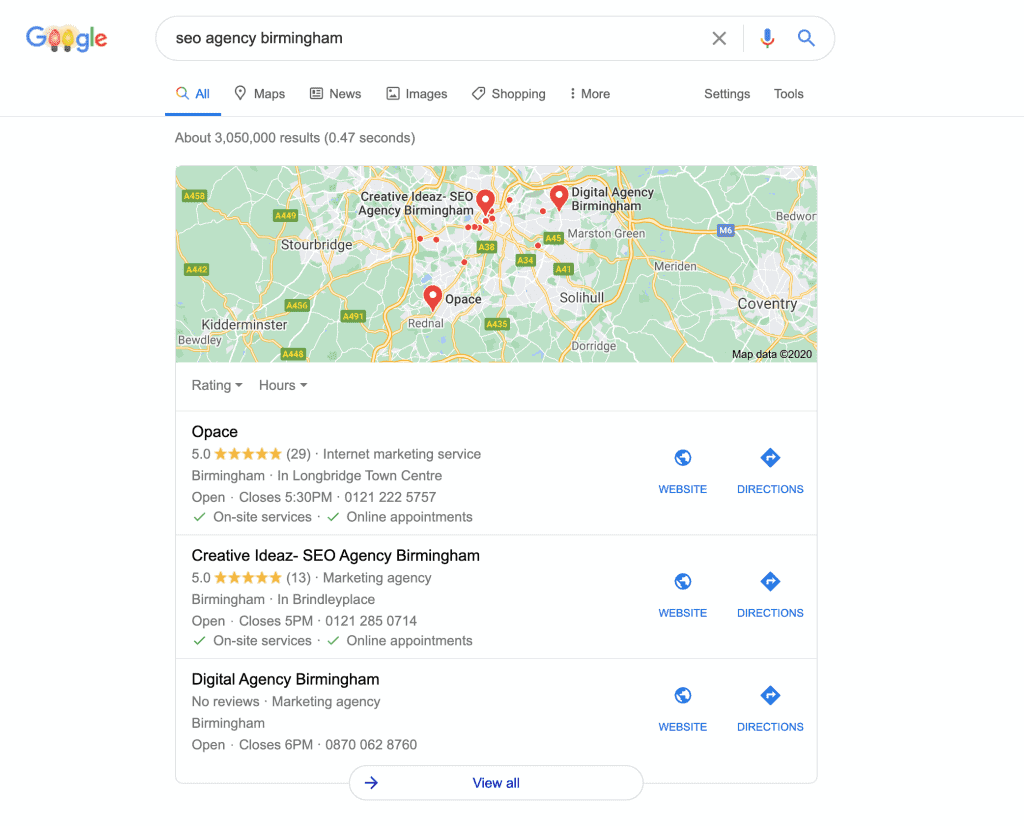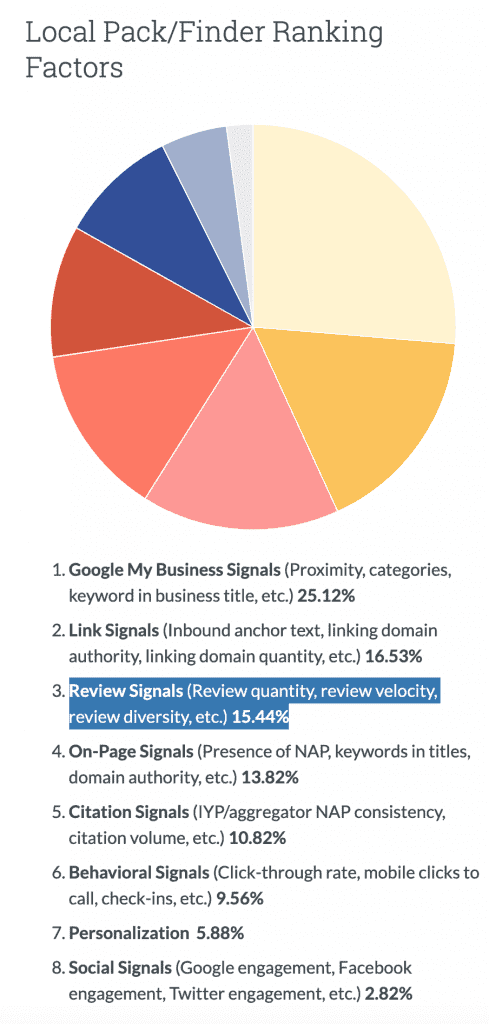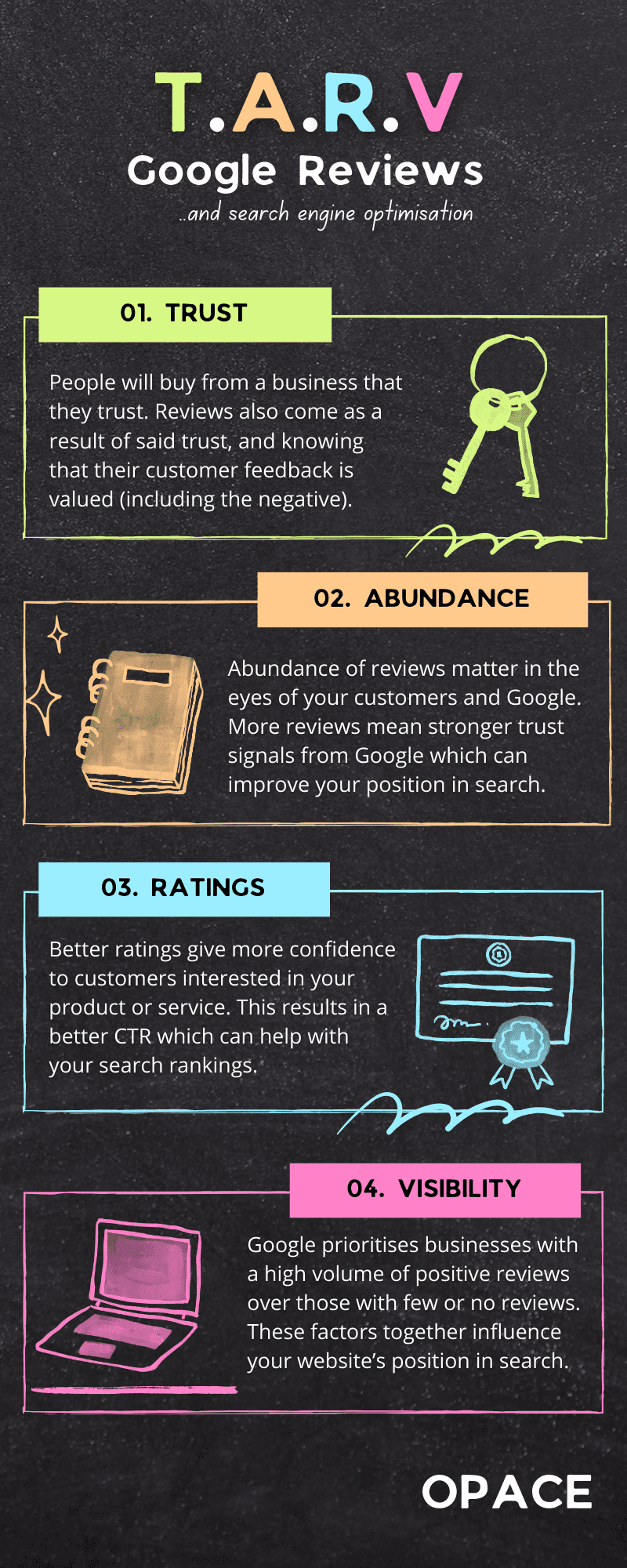Do Reviews Help SEO? Understanding Their Impact on Visibility
- 1 What are Google Reviews and what is their role in SEO?
- 2 How do Google Reviews help SEO?
- 3 Do only positive reviews help SEO?
- 4 Do negative reviews impact SEO?
- 5 Can fake reviews harm my SEO?
-
6
What are the benefits of reviews for SEO?
- 6.1 Reviews correlate with rankings
- 6.2 Click-Through Rates & engagement signals
- 6.3 Structured data and schema markup for enhanced organic listings
- 6.4 E-E-A-T (Experience, Expertise, Authoritativeness, and Trustworthiness)
- 6.5 The SEO impact of properly managing and responding to reviews
- 6.6 The role of keywords in reviews
- 7 What number of reviews are needed to improve SEO?
- 8 Where can you get reviews for better local SEO?
- 9 Final thoughts: online reviews and SEO go hand-in-hand
Online reviews have become an integral part of online search, influencing not just customer decisions, but also a business’s visibility in search results.
Whether they appear on a Google Business profile, Trustpilot, Facebook, or other platforms, online reviews serve as a trust signal for both potential customers and search engines.
But, do reviews help SEO? In this updated guide, we’ll explore how Google Reviews and other online review platforms contribute to rankings, local search visibility, and click-through rates, and ultimately how they help businesses gain a competitive edge in search.
Editor’s Note [12.02.2005]: Do reviews help SEO? We first addressed this question when we published our original article covering reviews and SEO in December 2020 and the article underwent some minor updates again in 2023. Google never rests when it comes to algorithm changes, trust signals, and ranking factors, so in this update, we wanted to look again at the link between Google Reviews, reviews in general and their impact on SEO.
What are Google Reviews and what is their role in SEO?
There are many types of reviews and review platforms online, but Google Reviews are specifically written by users online for others to see on any given Google Business profile.
You can find more about Google Business (formally Google My Business) optimisation below.
Google Reviews (and online reviews in general) are a form of social proof that can improve the trustworthiness of businesses in the eyes of customers and within the context of Google’s algorithm.
For potential customers, a business’s average review score will be listed within Google Maps listings along with other key business information as shown below.

Google Reviews are crucial for improving local SEO and click-throughs from Google Maps listings. Photo by henry perks on Unsplash
In addition to being a critical factor for customers deciding which business to use for a product or service, Google Reviews also play a significant role in SEO.
For those who understand the basics of SEO, reviews can be thought of as another signal to Google (a vote of confidence), similar to backlinks which help to demonstrate “trust”. Among other factors, they help Google determine where a business should appear in local search results and maps based on their Google Review score. The quality, quantity, and star rating of the Google Review also influence a business’s ranking position in Google’s Local Pack.
How do Google Reviews help SEO?
A common question we hear is — Do Google Reviews help to rank in search engines?
The short answer is, yes. Google Reviews can have a big impact on local SEO regardless of whether the business is part of a large chain or just a small independent store. Anything that helps customers assess the quality of a service/product is likely to be carefully considered by Google when deciding how to rank them.
You can view a more detailed overview of the Google and Bing algorithm factors most likely to impact SEO below, but much like quality content, authority backlinks, and social signals, reviews do play a role in SEO:
Let’s dive in a bit deeper to understand the what and the how.
Do only positive reviews help SEO?
To answer the question “Do reviews help SEO”, we need to consider the review sentiment and what they are saying as a whole about a product or service. Are they entirely positive or negative, is there a natural balance of positive, neutral and negative reviews, etc.

Positive reviews build trust in your brand and boost SEO
While we can’t know the exact mechanics of Google’s ranking algorithm, it’s logical to conclude that if reviews impact SEO, then the overall review rating/score also has an impact.
First, let’s break each section down and explain how reviews and SEO are linked, and how you can capitalise on them to improve search performance.
Local Pack Rankings
Google prioritises businesses with regular, favourable reviews and includes them in the top three results in local search rankings.
This is called “Local Pack” or “Map Pack” listings. The Local Pack is important as it’s where most users look for trusted businesses relevant to their search query.

Reviews play a key role in ranking Google Maps and Google Business listings.
Businesses located in the Local Pack are more likely to receive enquiries and business as a result.
Keywords
The words contained within reviews can also help Google to understand the type of business you are, and what services you offer.
Keywords can be established from within the content of reviews, helping Google determine relevance. If customers frequently include relevant keywords such as “This is a fantastic place for Indian food in Birmingham”, it gives the Google algorithm more ‘confidence’ in these being relevant and accurate terms.
Engagement
Google has always favoured engagement and reviews are no different.
A business that receives not only positive reviews, but frequent reviews will be a big positive in the eyes of the search engine.
Click-Through Rates
The impact of abundant reviews shouldn’t be ignored.
Imagine you are looking for a service — Are you more likely to use one with one thousand reviews averaging 4.7 stars, or a service with just six 5-star reviews?
This is another instance of social proof influencing the perceived trustworthiness of a product or service based on reviews.
Do negative reviews impact SEO?
It’s sometimes easy to overthink SEO and the impact that factors play when ranking in search.
Google understands that businesses aren’t always perfect, and negative reviews are an inevitable part of running any business. However, being able to engage with customers and respond to negative feedback constructively is not just beneficial for improving your service, it also shows Google that you are constantly active and engaging with users online.
Being active online also assures potential customers that should they encounter any difficulty or trouble, some time will be on hand to deal with it promptly.
Remember, showing other customers how you deal with negative reviews and issues can have just as much of an impact as a glowing 5-star review.
“89% of consumers are ‘highly’ or ‘fairly’ likely to use a business that responds to all of its online reviews”
Negative reviews that appear now and again shouldn’t be daunting — it’s a chance to improve the future operations of your business and show customers that you can be trusted with their custom.
However, it’s only logical then that an overwhelming number of negative reviews that aren’t properly managed will have the opposite impact.
Again, put your self in the mind of a potential visitor who sees these reviews, the whole effect will be reversed and they will distrust your product or service. This is likely to send negative signals to Google and therefore negatively impact SEO.
Can fake reviews harm my SEO?
You, like many website owners before you, might be thinking that the process of getting reviews is too risky, too hard, or your customers simply won’t leave them.
We’ve heard all of these reasons in the past, but it simply isn’t true. As long as you invest both time and effort into the process and the reviews are correctly managed, it will pay off in the long run.
However, the trap some website owners fall into is that they want a quick win. This could either be positive fake reviews that attempt to make a product or service look more trustworthy, or negative fake reviews against a competitor to try and harm their credibility.
Fake reviews can take many forms, including AI-generated reviews, buying fake reviews, and so on. There are plenty of providers out there that will provide fake reviews and attempt to pass their service off as “real reviews” by “real people”. In many cases, the reviews will be added by real people, but they will use fake accounts set up to simply post fake reviews and these accounts will stand out like a saw-thumb as being fake.
Also, Google might raise an eyebrow when it sees multiple reviews that arrive from an identical IP address. This could be completely innocent. Perhaps multiple service users from the same business were impressed with your offering and wished to leave positive feedback. All the same, it can also resemble fraudulent, fake reviews and feedback. Google will notice this and might take action.
Google’s algorithms are designed to pick up on certain red flags, with the more common ones being plagiarised or duplicate content, link spamming, etc. Much like other “black hat” SEO techniques, Google is likely to spot fake reviews and consider this as “black hat” as well.

Google has a nose for fake reviews. Ensure any feedback on your site is genuine
Chances are that anybody trying to game reviews will be detected and penalised by Google.
We’ve covered fake reviews in detail below, including the topic of AI-generated reviews in detail, so be sure to give this a read:
The Rise of AI-Generated Reviews: How to Spot Fake Reviews Easily & Deal With Them
What are the benefits of reviews for SEO?
Anybody with an online business will at least be partially aware of SEO and Google’s ever-changing algorithm:
The days of spamming keywords and artificially building links to gain SEO traction have long passed in favour of natural organic signals.
Now, Google places a greater emphasis on user experience and helpful content. This means that reviews and SEO are more intrinsically linked than ever before.
Using reviews for SEO will help to boost overall authority, reputation and traffic quality. While receiving a Google Review is one thing, harnessing online reviews correctly can significantly boost search visibility and even increase conversions.

Conversions, Google reviews and SEO. Photo by Myriam Jessier on Unsplash
Reviews correlate with rankings
A study by Bright Local in 2020 demonstrates how reviews and various other factors correlate with local SEO, with reviews overtaking backlinks as being the second most important factor for Local Pack rankings:
| Local Pack | Local Organic |
|---|---|
| 1. Google My Business (33%) | 1. On-page (32%) |
| 2. Reviews (16%) | 2. Links (31%) |
| 3. On-page (15%) | 3. Behavioral (10%) |
| 3. Links (15%) | 4. Personalisation (7%) |
| 5. Behavioral (8%) | 4. Google My Business (7%) |
| 6. Citations (7%) | 6. Citations (6%) |
| 7. Personalisation (6%) | 6. Reviews (6%) |
This seems to be backed up by a previous 2018 study undertaken by Moz.com which shows a similar pattern:

Reviews have 15.44% impact on Local Pack

Reviews have 6.47% impact on organic rankings
Click-Through Rates & engagement signals
It is important to understand that Google will track how often your business is clicked within search results compared to your competitors. It will use this metric as a signal for search engine rankings.
This is often referred to as a CTR or Click-Through Rate. Businesses with a higher CTR are more likely to outrank competitors, as Google sees this as a strong engagement signal.
So the question then comes, how can we increase Click-Through Rates to help improve SEO? Well, one method is to encourage online reviews and manage them properly. As a general rule of thumb, the more reviews you have with positive sentiment, the more click-throughs you can expect from visitors interested in your product or service.
Structured data and schema markup for enhanced organic listings
Remember the important term used earlier, “trust”? E-E-A-T (“Experience”, “Expertise”, “Authoritativeness”, and “Trustworthiness”) is a framework that Google uses to evaluate the quality and credibility of content and is an essential part of Google’s Search Quality Rater and Helpful Content Guidelines.
Therefore, simple reasoning means that if reviews are one of the best ways to demonstrate “trust”, and “Trustworthiness” is an important part of Google’s E-E-A-T framework, then they must have a role in SEO and Google’s ranking algorithm.
We won’t go into detail here about E-E-A-T as it’s a significant topic in its own right, but you can find out more information below:
Why Good Content Matters: SEO Content Creation Guidelines [UPDATED]
To try and piggie back off the E-E-A-T framework to reviews, we’ve come up with our own term named “T.A.R.V”. This stands for “Trust,” “Abundance”, “Ratings”, and “Visibility”, which again ties in the “trust” element and focuses solely on Google Reviews and their impact on search ranking.

T.A.R.V – How reviews help SEO – an infographic from Opace
Remember, your online reviews should be used to spread the word about your service while showcasing customer satisfaction.
Google Reviews, and most other online reviews, can be embedded on your website and shared on social media. Potential customers will see the quality of your service, the abundance of reviews, and how you are committed to solving problems.
The SEO impact of properly managing and responding to reviews
Responding to reviews is an important part of running a business for many reasons and is valued by the Google search algorithm. Interacting with reviews and solving customer complaints is integral to generating trust which helps to attract new customers.
Google has been clear about the impact of responding to customer reviews. and the impact this can have on local rankings.
In the words of Google:
“when you reply to reviews, it shows that you value your customers and their feedback”.
This should be capitalised on by businesses looking to improve their SEO and trustworthiness.
The role of keywords in reviews
You may be surprised to learn that keywords play an important role in reviews. This doesn’t mean you should be flooding your reviews with keyword stuffing and spam, but it should be an important consideration when replying to feedback. This is another factor that can help with your position within search listings.
For example, you may be a local coffee shop and receive generic feedback such as:
“Great experience and quick service”. — Customer770
Although this is good feedback to receive, it doesn’t tell Google anything about who you are and what you do. T
his is a good opportunity to dive in and reply with something along the lines of the following:
“We appreciate your feedback! At (Business name) we are proud to serve the best coffee in Birmingham”. — Business name
This allows Google to recognise that you are a coffee shop located in Birmingham, and also includes the keyword phrase “Best coffee in Birmingham”.
The benefits of this approach are clear to see:
- Specifies business name and type — Google now knows you are a coffee shop.
- Includes a local keyword — “Best coffee in Birmingham” helps with your local SEO
- Natural language — Doesn’t contain keyword stuffing, is an authentic reply
Don’t forget that Google has increasingly sophisticated tools that can easily detect when you are trying to mislead their algorithms. Be sure to remain authentic above all else, while including elements that help Google detect what your business is, and the type of service you provide.
The more detailed and specific customer reviews can be regarding your service the better!

Always optimise your reviews and content for keywords on Google Search. Photo by Solen Feyissa on Unsplash
Of course, it’s no good to implement a strategy that helps to establish reviews for SEO if you ignore everything else needed.
Other areas of critical consideration include understanding search intent, regular planning, reviewing and measuring your efforts, building Topical Authority and optimising for website speed. But when combined, these activities can have a powerful effect on improving your overall Google ranking.
What number of reviews are needed to improve SEO?
While there’s no exact number of reviews that can be considered “enough” to impact SEO, aiming for 10-15 reviews as a minimum is a good start.
Having 4 or 5 reviews isn’t enough to give customers confidence or Google enough data to be considered reliable.
It’s not just the number of reviews that is important, but how recent your reviews are. Google values regular fresh content and reviews are no different — this is why it is so important to be active in replying to all of your reviews while naturally including keywords at the same time.
Businesses with more than 50 reviews tend to stand a better chance of ranking within the local pack in search listings. Remember — a large volume of gradual but frequent reviews (particularly positive) is a strong trust signal that can be used by search engines. Online reviews shouldn’t be looked at as a one-time activity you can focus on part-time. Making the most out of online reviews for SEO requires a consistent approach to maximise results.
Finally, having many positive reviews and increasing buyer confidence will help with your CTR as potential customers feel there is less risk involved in buying from a trusted source with many recent reviews available. This leads to more engagement, clicks, and consequently better SEO rankings.
Where can you get reviews for better local SEO?
Quality reviews matter and Google Reviews isn’t the only place where reviews can help your SEO efforts.
Here are a few more review sites that you can utilise to improve your search position. Diversifying the review platforms you use will help generate trust when potential customers are reading about your product or service. This provides a wider variety of reviews and platforms, most of which will probably be detected and shown on your Google Business profile anyway.
Not only that, but some users may distrust Google Reviews for one reason or another, but favour Trustpilot for example. By diversifying where you get reviews, you’re more likely to ensure customers find a platform they trust, which in turn will help with sending “trust” signals to Google.
Here are some of the popular online review platforms worth considering:
Facebook Reviews
Facebook is another platform that can be leveraged for social proof and trust.
Facebook Reviews can help to further increase brand awareness and reputability while providing SEO benefits indirectly. This can improve your position in search.
Facebook pages can even rank in search if the page in question meets certain criteria and is well-managed and frequently reviewed and updated.
TrustPilot
Another platform known for trustworthiness is TrustPilot.
Reviews within Google often appear from TrustPilot in branded searches and provide an easily embeddable button that can be used on your website.
This displays your review score and can help drive conversions due to increased trust generated.
Yelp
If you have a service-based business such as a cafe or a restaurant, then Yelp is a worthy consideration when it comes to reviews.
Yelp reviews are able to rank within Google and even increase your local search visibility if harnessed correctly.
Be sure to abide by Yelp’s guidelines as they can be strict when it comes to reviews and incentivising reviews from your customers.
Feefo
Similar to TrustPilot, Feefo is another verified review platform that provides a trustworthy source of feedback from customers.
This means that search engines such as Google can safely trust reviews listed on the site and utilise the data for star ratings within rich snippets. Integrating Feefo widgets can further reinforce buyer confidence and trust which in turn increases conversions.
Platforms such as Feefo can also improve your listings within Google Shopping via Google Seller Ratings. This is always a nice bonus if you are selling products online.
Final thoughts: online reviews and SEO go hand-in-hand
Online reviews, and in particular Google Reivews, are crucial for customers to gain a better understanding of the quality of your business, but they also serve as a reliable indicator for Google and wider search algorithms.
The more frequent the reviews and the quality of the review score, the higher the chances are of ranking in the local pack in search. Additionally, these reviews lead to increased buyer confidence and function as social proof, improving CTR, and can be the difference between a customer using your service, or a competitor’s service.
The importance of search position in a competitive market is illustrated below by Backlinko:
“the #1 result in Google has a 10x higher CTR compared to the #10 results”
Source Backlinko
So, be sure to stay on top of your online reviews and SEO strategy as a whole. Remain dedicated to responding to customer feedback on an ongoing basis to succeed within search, and maximise your existing SEO efforts.
If you need the services of an SEO agency, free to get in touch to see how we can help.
What are your experiences with online reviews and SEO? Be sure to drop us a comment below or on any of our social media profiles.
« Back to Glossary Index




